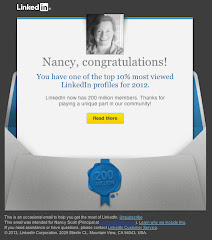
Monday, March 26, 2012
Anxiety: Statistics Say You Probably Have It and It's Probably Growing.

Friday, March 23, 2012
How "Shaky, Shaky" Could Evolve to "Thought Leadership"

The CMO Council reports that marketers want an agency partner who can "do it all" -- mobile, social, multi-channel, web, search, CRM. Ouch!
Is this demand reasonable? It may not matter, since 58 percent of marketers say they aren't happy -- and disgruntled marketers lead to shaky vendor relationships. It happened suddenly last summer when quite a few big guys switched agencies. United Airlines. Monsanto. S.C. Johnson. Sprint.
Industry observers are taking note of the shake-ups. Some say the shift is away from traditional "advertising" to a marketing platform that emphasizes talking with -- not at -- customers . . . like Facebook, for example.
On Leap Day 2012, Facebook evolved from an advertising to a marketing platform. Central to the switch was Facebook's determination to ramp up engagement with current fans and back-off the push for new fans. Facebook is betting that a deeper focus on "storytelling" can turn content into a word-of-mouth recommendation. They call this switch to storytelling a "sponsored story."
Marketing Prof's February 29 "Marketing Smarts" podcast featuring Mike Levy explains the essential component of this storytelling. Levy says "thought leadership" naturally emerges from the unique experiences, insights, and abilities that set one company apart from another. "The stuff that fascinates you and that you found helpful and the stuff that helps you live your life...there is a population out there that will find the same things fascinating and the same things helpful."
A personal story brought this concept home to me: ifixit.com.
Because I work on a Mac, I discovered this company years ago and fell in love with their dedication to helping me "fix it myself." They posted videos and detailed instructions on how to get inside the Mac to add memory and do other self-maintenance. Ifixit paved this road to repair because the founder believed in it profoundly. A few years ago, they took the concept even bigger, stretching their beliefs to self-repair of anything and everything. Not only is ifixit's philosophy eco-friendly, it's empowering to those of us who are frustrated that simple repairs evoke migraine headaches. I really love ifixit and the people who founded and run it. That's how they've built their business: by being who they are and letting the marketplace "find them" … in short, by exercising "thought leadership."
Erika Napoletano agrees. "Popular is the last thing smart business people should want to be … By pursuing an unpopular path, you are actually narrowing down and refining your notion of the audience with whom you truly want to be popular after all."
Reflection, authenticity, storytelling, outreach: Shaken by the poisonous atmosphere of political advertising, will 2012 move our marketing toward thought leadership? I believe it will.
